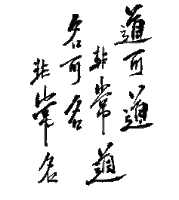Thursday, December 30, 2010
Wednesday, December 29, 2010
《道德經》 Tao Te Ching: Chapter 1
is not the eternal Tao.
The name that can be named
is not the eternal name.
The Tao is both named and nameless.
As nameless it is the origin of all things;
as named it is the Mother of 10,000 things.
Ever desireless, one can see the mystery;
ever desiring, one sees only the manifestations.
And the mystery itself is the doorway
to all understanding.
第一章
道可道,非常道,名可名,非常名。無名,天地之始,有名,萬物之母。故常無欲以觀其妙,常有欲以觀其徼,此兩者同出而異名,同謂之玄,玄之又玄,眾妙之門。
Click for analysis.
Thursday, December 16, 2010
《道德經》 The Tao Te Ching Project
Unlike Descartes and many modern philosophers, Laozi (老子) didn't attempt to use deductive reasoning to find the truth and prove it to the world. He already knew about the ultimate truth. Not only did he know, he experienced and lived it! Therefore, people who met him kept bugging him to teach them "the way"; Tao Te Ching is the result of those requests.
I'll interpret the Tao Te Ching verse by verse (81 chapters/sections/verses (章) in total) with the help of the book that I'm studying, Change Your Thoughts - Change Your Life: Living the Wisdom of the Tao, which already did what I'm about to do. I'll take what I like from the book's interpretation and combine it with my personal take. The most amazing thing about the Tao Te Ching is its open-endedness; even the same person can have different interpretations of the text in different times, let alone different individuals. There's no one "right" way to interpret it. As you read it, you'll only learn the things that are relevant to you. Tao Te Ching is like a lamp that shown you the way that's always within you.


